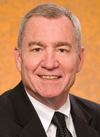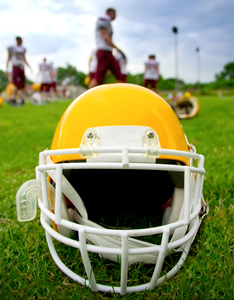 July 18, 2012 – Every year in the United States there are an estimated 1.6 to 3.8 million sports-related concussions. In high school football alone, there are approximately 67,000 diagnosed concussions each year.
July 18, 2012 – Every year in the United States there are an estimated 1.6 to 3.8 million sports-related concussions. In high school football alone, there are approximately 67,000 diagnosed concussions each year.
Wisconsin recently enacted a new law regarding the rules and procedures for dealing with concussions and head injuries sustained while participating in youth athletic activities.
2011 Wisconsin Act 172 created Wis. Stat. section 118.293 of the Wisconsin Statutes, which took effect on April 17, 2012. The law ensures everyone who is involved in youth sports – organizers, participants, coaches, parents and officials – understands the nature and risk of concussions and sets a mandatory procedure for when such an injury is suspected. Therefore, those involved with organized youth athletic activities, as well as the lawyers who advise them, should be aware of the new duties and obligations created under the statute.
What is a Youth Athletic Activity?
The statute applies to those involved in a “youth athletic activity,” which is defined as “an organized athletic activity in which the participants, a majority of whom are under 19 years of age, are engaged in an athletic game or competition against another team, club, or entity, or in practice or preparation for an organized athletic game or competition against another team, club or entity.”
The definition of this term encompasses not only organized sports in public and private schools but also any type of organized youth sports activity not associated with a school, such as little league, youth soccer, and the like. However, the term does not include a college or university activity or an activity that is incidental to a nonathletic program.
Under the new law, the persons operating youth athletic activities must distribute a concussion and head injury information sheet to coaches and participants at the beginning of each season. Each participant must sign the information sheet and return it to the activity operator before he or she is allowed to participate in the activity. If the participant is under the age of 19, the parent or guardian must also sign the sheet.

Who is a Health Care Provider?
A person who has been removed from a youth athletic activity for suspected concussion or other head injury may not participate in a youth athletic activity “until he or she is evaluated by a health care provider and receives a written clearance to participate in the activity from the health care provider.” So, who is a “health care provider” under the new rule?
The statute says a “health care provider” is a person to whom all of the following apply:
He or she holds a credential that authorizes the person to provide health care.
He or she is trained and has experience in evaluating and managing pediatric concussions and head injuries.
He or she is practicing within the scope of his or her credential.
“Credential” means a license or certificate of certification issued by this state. On its face, it is unclear if the definition of “health care providers” is limited to physicians only or if it includes other health care professionals, such as nurses or EMTs.
However, according to the Wisconsin licensing regulations for medical practices, only licensed physicians are certified to diagnose and treat human health issues. Therefore, “health care providers” includes only licensed physicians because the evaluation and management of pediatric concussions and head injuries are only within the scope of the credentials of a licensed physician. “Health care providers” is further limited to those physicians who have experience and training in evaluating and managing pediatric concussions and head injuries.
“When in Doubt, Sit Them Out!”
The law also gives legal effect to the Wisconsin Interscholastic Athletic Association’s policy of “When in Doubt, Sit Them Out!” If a coach, official, or health care provider determines that a participant is exhibiting symptoms of a concussion or head injury or otherwise suspects a participant has sustained a concussion or head injury, then the coach, official, or health care provider is now required to remove the participant from the activity.
Once removed from an activity for this reason, the person may not participate in any youth athletic activity until he or she is evaluated by a health care provider and receives written clearance to participate in such activity. This means a child removed from a game because of a determination or a suspicion of a concussion or head injury may not return to the game, return to practice after the game, or participate in team practice until he or she is evaluated by a “health care provider” and receives written clearance to do so.
Liability and Immunity
The law includes language relating to civil liability and immunity. First, any coach, official, or volunteer who fails to remove a player from the activity, after determining or suspecting a concussion or head injury, is immune from civil liability for any injury resulting from the failure to remove unless it constitutes gross negligence or willful or wanton misconduct.
Second, any volunteer who allows a player to participate in the activity, after the player has been removed, without written clearance from a health care provider is immune from civil liability for any injury resulting from that act unless the act constitutes gross negligence or willful or wanton misconduct. Finally, the law does not create any liability for, or a cause of action against, any person.
Conclusion
The concussion law is designed to protect the health and safety of children participating in organized athletic activities and not to punish the persons operating or involved in the activity for injuries resulting from any failure to follow the procedures set forth.
However, it is important all adults who are involved in youth sports programs have proper forms relating to the requirements of the law and follow the statutory procedure. More information can be found on this new law and concussions in general as well as sample forms at the WIAA website.
About the Author
Patrick J. Fiedler, Marquette 1980, is a partner at Axley Brynelson, LLP and a member of its litigation practice group. His areas of practice are civil litigation and alternative dispute resolution. He works out of the firm’s Madison and Waukesha offices. Contact him at (608) 283-6753 or at pfiedler@axley.com.
